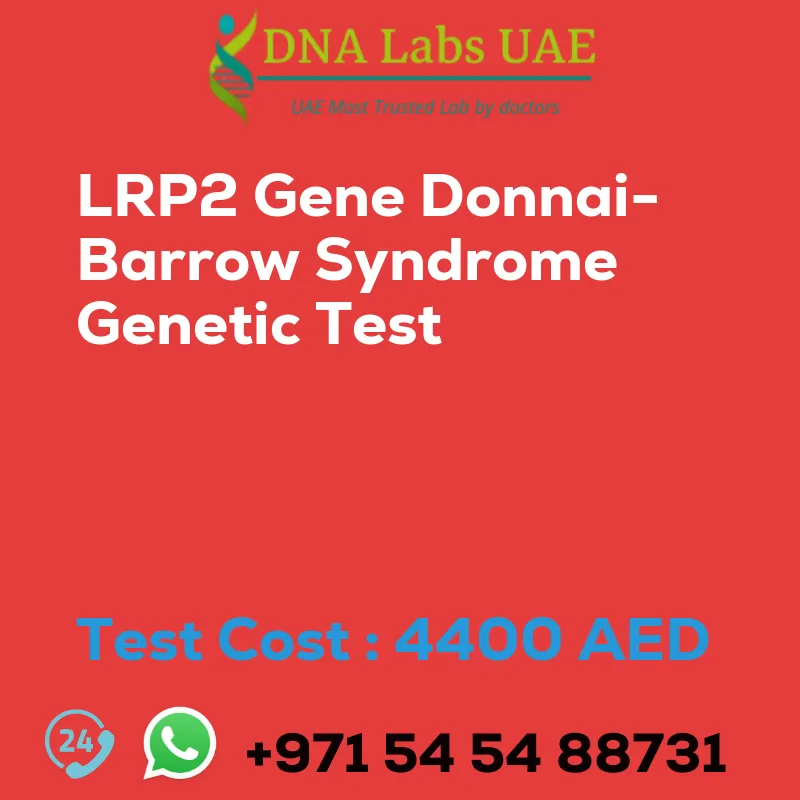LRP2 Gene Donnai-Barrow Syndrome Genetic Test
Introduction
The LRP2 gene, also known as low-density lipoprotein receptor-related protein 2, is associated with Donnai-Barrow syndrome. This rare genetic disorder is characterized by multiple features including hearing loss, intellectual disability, facial dysmorphisms, and abnormalities of the eyes, heart, and other organs.
Test Details
The LRP2 Gene Donnai-Barrow Syndrome Genetic Test is a NGS (Next-Generation Sequencing) genetic testing method. NGS technology allows for the analysis of multiple genes simultaneously. In the case of Donnai-Barrow syndrome, this test can identify mutations or variations in the LRP2 gene that may be responsible for causing the syndrome.
Components and Price
- Test Name: LRP2 Gene Donnai-Barrow Syndrome Genetic Test
- Price: 4400.0 AED
- Sample Condition: Blood or Extracted DNA or One drop Blood on FTA Card
- Report Delivery: 3 to 4 Weeks
- Method: NGS Technology
- Test Type: Dysmorphology
- Doctor: Pediatrics
- Test Department: Genetics
Pre Test Information
Before undergoing the LRP2 Gene Donnai-Barrow Syndrome Genetic Test, it is important to provide the clinical history of the patient. Additionally, a genetic counseling session will be conducted to draw a pedigree chart of family members affected by the syndrome.
Test Process
The test involves obtaining a DNA sample, usually through a blood or saliva sample. The DNA is then sequenced using NGS technology to identify any variations or mutations in the LRP2 gene. This information can help in diagnosing individuals with Donnai-Barrow syndrome and providing genetic counseling to affected individuals and their families.
Importance of Qualified Healthcare Professionals
It is crucial to note that genetic testing, including NGS testing, should be performed and interpreted by qualified healthcare professionals, such as geneticists or genetic counselors. These professionals can provide accurate and comprehensive information about the test results and their implications for the individual being tested.
Conclusion
The LRP2 Gene Donnai-Barrow Syndrome Genetic Test is a valuable tool in diagnosing individuals with Donnai-Barrow syndrome. By identifying mutations or variations in the LRP2 gene, this test can provide crucial information for genetic counseling and further management of the syndrome.
| Test Name | LRP2 Gene Donnai-Barrow syndrome Genetic Test |
|---|---|
| Components | |
| Price | 4400.0 AED |
| Sample Condition | Blood or Extracted DNA or One drop Blood on FTA Card |
| Report Delivery | 3 to 4 Weeks |
| Method | NGS Technology |
| Test type | Dysmorphology |
| Doctor | Pediatrics |
| Test Department: | Genetics |
| Pre Test Information | Clinical History of Patient who is going for LRP2 Gene Donnai-Barrow syndrome NGS Genetic DNA Test. A Genetic Counselling session to draw a pedigree chart of family members affected with LRP2 Gene Donnai-Barrow syndrome NGS Genetic DNA Test gene LRP2 |
| Test Details |
The LRP2 gene, also known as low-density lipoprotein receptor-related protein 2, is associated with Donnai-Barrow syndrome. Donnai-Barrow syndrome is a rare genetic disorder characterized by multiple features including hearing loss, intellectual disability, facial dysmorphisms, and abnormalities of the eyes, heart, and other organs. NGS (Next-Generation Sequencing) genetic testing is a type of genetic testing that uses advanced sequencing technologies to analyze multiple genes simultaneously. In the context of Donnai-Barrow syndrome, NGS genetic testing can be used to identify mutations or variations in the LRP2 gene that may be responsible for causing the syndrome. NGS genetic testing involves obtaining a DNA sample, typically through a blood or saliva sample, and sequencing the DNA to identify any variations or mutations in the LRP2 gene. This can help in diagnosing individuals with Donnai-Barrow syndrome and providing genetic counseling to affected individuals and their families. It is important to note that genetic testing, including NGS testing, should be performed and interpreted by qualified healthcare professionals, such as geneticists or genetic counselors, who can provide accurate and comprehensive information about the results and implications for the individual being tested. |








